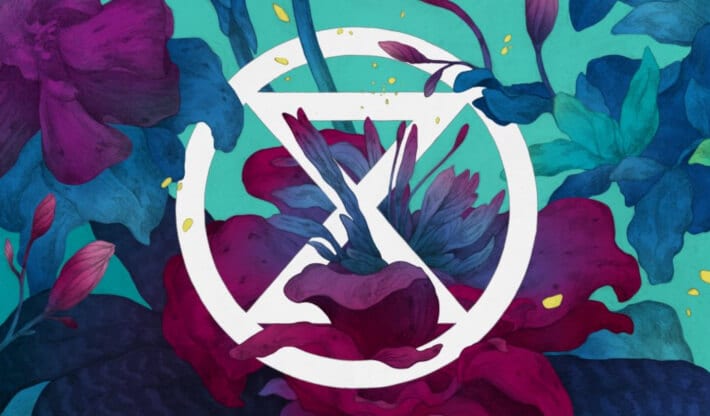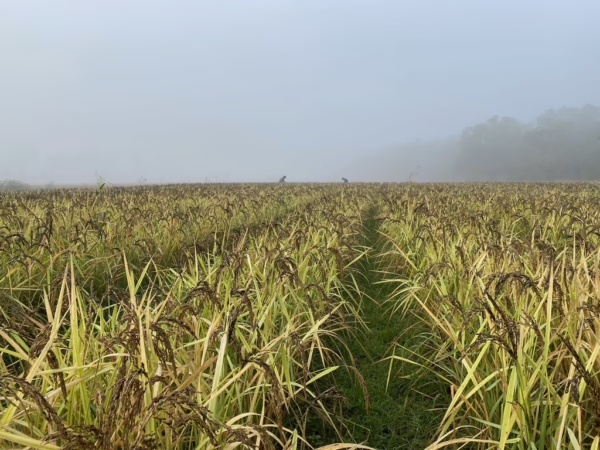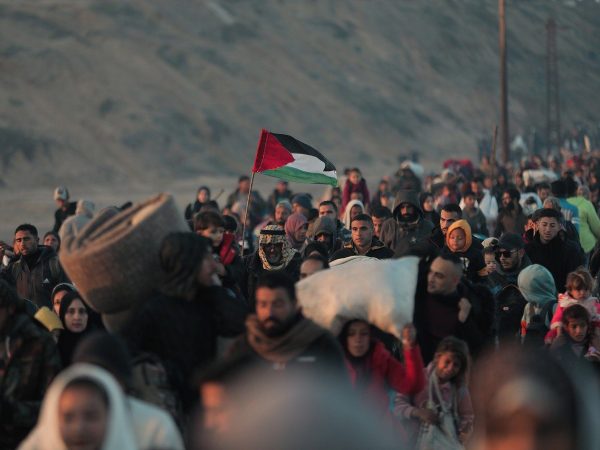In five weeks’ time I will be traveling from our small rural town to London for a fortnight of rebellion. I will probably do some things that are illegal. I may get arrested. I heard anecdotally last week that those willing to be arrested are often supported by their faith. Is that true? How did I get here again and, as peace-loving Buddhist, why am I planning on causing disruption?
We demonstrate our desperation by breaking the laws of the land.
The protests in London and across the UK are being organised by Extinction Rebellion, or XR for short. XR believe that climate heating is spiralling upward toward unstoppable feedback loops, and that if we don’t take drastic action, civilization as we know it is under grave threat. It wants the government to tell the unvarnished truth about the magnitude and urgency of our situation, and of the ecological catastrophe that has already wiped out so much of our beautiful plant and animal life. I won’t go into the science—you can find it in many other places, and to be frank I don’t think I have the stomach for it this morning.
When XR formed, its founders decided that the only “drastic action” with a chance of turning this ship around would be civil disobedience. Following in the footsteps of the suffragettes and the supporters of Martin Luther King, we demonstrate our desperation by breaking the laws of the land. This sometimes cracks through the collusion of our press and media with those in power and gets us noticed. When we are noticed, we are ready with our next two demands after “telling the truth”—that we act now to reduce emissions and biodiversity loss to net zero by 2025, and that we do so by using citizen assemblies to lead the government’s decision making. XR UK are hoping to soon add a fourth demand about justice, requiring that these changes are made in a way that is just and equitable for all. In this country and across the globe, poorer communities, people of colour, and people who are already discriminated against are already suffering from the worst of the effects of climate change.
Friction and Faith
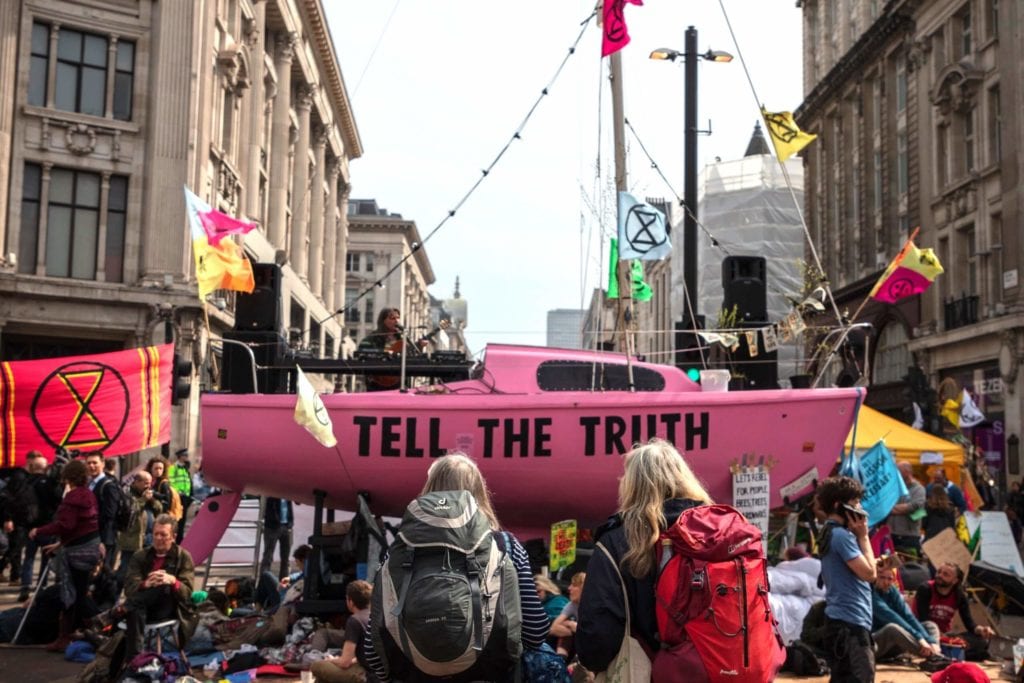
XR is unpopular with many people. We were unpopular with members of the public—taxi drivers, office workers—whose ordinary lives were disrupted by road blocks during the last rebellion. We are unpopular with those who are afraid of upsetting the status quo and of heading into dangerous anarchy. We are unpopular with those who think we should be using the traditional structures of democracy to make changes, sometimes these people have dedicated their lives to gaining power to use for good in this way. We are unpopular with most people—not all—on the right of the political spectrum, who suspect that our demands are thinly disguised calls for far-left policies (and they are right to be afraid of losing some of what they have).
In this country and across the globe, poorer communities, people of colour, and people who are already discriminated against are already suffering from the worst of the effects of climate change.
This is the first reason why my Buddhist faith is an essential support for me in this work. As a people-pleaser, I have spent a lifetime trying to keep everyone around me happy. If someone doesn’t like me, I work hard until I can change their mind. Being a member of XR makes it impossible to do that. One of the residents of our temple went silent when we mentioned the rebellion at our community meal last week. I know that they strongly disapprove. Another sangha member ranted angrily at me about how XR are getting it terribly wrong. A close family member hates what I’m doing and won’t speak to me about it at all. As I write, I remember a clip from a film about XR in which a meditating Buddhist blocked a road as she was screamed at by a city worker. Tears streamed down her face as she repeated the word “sorry” again and again. She didn’t move, though. Her faith helped her to stand strong against his fury because she deeply believed that what she was doing was necessary. My faith gives me the courage to stand by my convictions even when all around me are telling me I’m wrong, following the example of the Buddha and leaning in to something that is more permanent than my popularity or social standing. Of course, this doesn’t mean that we don’t listen to critiques, or empathize with those who are affected by our protests, or continually reform the movement in response to feedback. We can and still do get things wrong. It does mean, however, that we don’t stop what we’re doing merely to keep people happy.
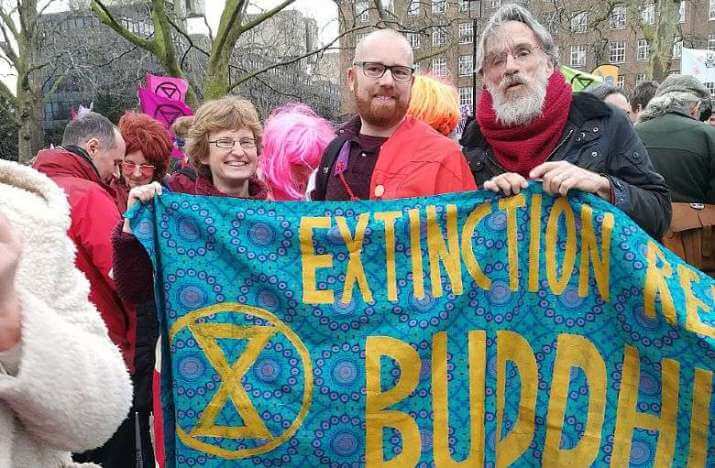
Courtesy of Satya Robin
The second reason my faith supports me is that it connects me with the suffering of the planet, and it helps me to contain the resulting anger, despair, and grief. My life was much simpler before I “woke up” to the reality of our situation only a year ago (I was late!). Since then, I have spent long periods in what has felt like mourning as I encounter the results of our greed, hate, and delusion in a truly embodied way. It sometimes feels like too much, and that is where “sangha” and “Buddha” comes in. As groups who have campaigned on environmental issues for decades know well, this work is too much for one person to carry. It is lonely to witness flashes of truth among the crazy, profligate continuance of life-as-usual. We need to build sanghas of people who “get it”—for me, XR Buddhists, and the wider family of XR—where we can trust each other and where we know that we’re not alone. I also need the Buddha as a place where I can take my pain, and know that it is received and enveloped in compassion. Wherever I am and however difficult things seem, the Buddha is always there for me.
Striving without Attachment
This is how our religious founders showed us how to live—simply, with kindness, with forgiveness, and with appreciation for all that we receive.
Alongside giving me the courage to be disliked and helping me to hold the grief, my faith also grounds me in a bigger picture. I’ve done a lot of reading recently about the possibility of it already being too late to turn the ship around—of the not-so-far-in-the-future dissolution of civilization. If I didn’t feel held by the Buddha, I don’t know how I’d be able to allow this as a feasible outcome and to experiment with the possibility of it being true. With the Buddha’s support, I’ve come to a place of thinking: if we are living on a “hospice planet,” that’s okay. Maybe the Universe has a bigger plan—a fresh unfolding of life elsewhere, another iteration, a leap in evolution. Whether or not we have passed a point of no return, I will continue to act, doing my tiny bit to raise awareness and to care for the patch of land beneath me and around me as best I can.
I don’t know whether more of those willing to carry out high-risk civil disobedience are people of faith. I do know that without my faith I would find it very difficult to be an activist in this way. I also know that everyone I encounter within XR is not only driven by the fear of what will happen if we don’t stop the destruction. They are guided by a dream of what might be possible if we live more lightly on the Earth. Imagine it for yourself now: less busyness, more time in green spaces, less stuff, more connection. This is how our religious founders showed us how to live—simply, with kindness, with forgiveness, and with appreciation for all that we receive. We can all be inspired by this bigger story and weave our little lives into the tapestry. My wish for you is that you find your own inspiration, consolation, and grounding, and allow yourself to be held as we all take steps forward into the unknown.
This article was originally published on Buddhistdoor Global. It is reprinted here with permission.
